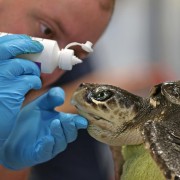And Then There’s the Human Element…
 I saw this headline and photo on my Facebook feed this morning:
I saw this headline and photo on my Facebook feed this morning:
“The race is on in bid to save sea turtles.”
You may have had a similar reaction to mine: “Aww, that is wonderful. I’m glad people care.”
And then I did something interesting. I re-read the story as a metaphor for people who are cold-stunned. Our world can cold-stun people through oppression, violence, institutionalized racism, rape culture, and many other forces greater than a person who swims in them, gets caught in their currents.
Here’s the original text: “And then there’s the human element,” Prescott said, making the argument for this being a good year. “They’re what determines if one turtle lives or dies. With a lucky wind and a human being at the right place, they make these the lucky turtles.”
What if we rewrote it to read, “And then there’s the human element. They’re what determines if one human lives or dies. With a lucky wind and a human being at the right place, they make these the lucky humans.”
I’m sitting with questions for myself. Am I a lucky wind? How am I contributing to the currents that sweep some far from safety? What can I do to not just be in the right place to help, but to change the conditions that created the current in the first place?
I went on to read the comments, and as expected, there was the lone voice misstating Darwin, incorrectly applying his theory to support his view that the wrong-turning turtles deserved to die so the right turtles could live.
I think this misinterpretation and misapplication of Darwin’s theories has done untold damage to our willingness to care for each and every person with whom we share our global home. In my state, the majority voted in a Governor who is touting the “Bootstrap Theory” which essentially says the same thing: some turtles – humans – deserve to die, and some deserve to live. Taking away poor people’s access to healthcare does exactly that. It is not an overstatement or exaggeration.
My wish this holiday season is for us to collectively retire this inappropriate Darwinian justification for lack of equity in our world. Instead, let’s embrace the words of another visionary, Paul Wellstone, who said, “We all do better when we all do better.”
(Thank you to Bethany Sanchez for reminding me of Paul Wellstone’s words.)

Leave a Reply
Want to join the discussion?Feel free to contribute!